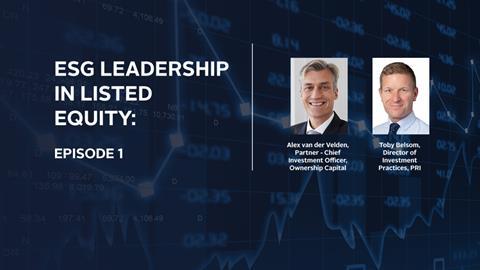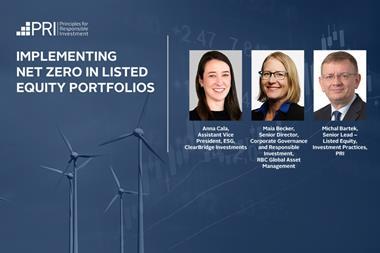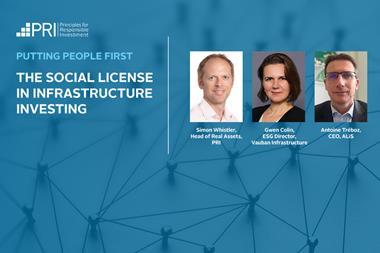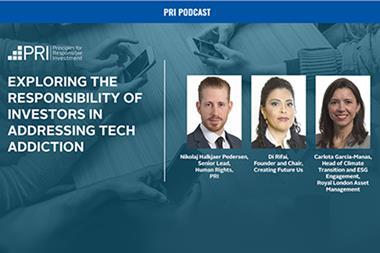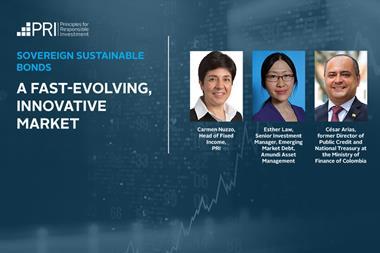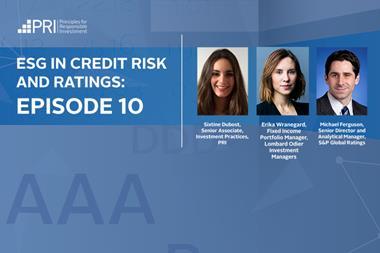They discuss Alex’s journey to becoming a leader in the field of ESG integration in listed equity, his views on current practices and how they are evolving, and the challenges and opportunities that remain for investors looking to integrate ESG issues within their listed equity investments.
Leadership in listed equity episode 1
With Toby Belsom, PRI, and Alex van der Velden, Ownership Capital
Note: The Principles for Responsible Investment podcast is designed to be heard. If you are unable to do this, this transcript offers an insight into the episode.
Transcripts are generated using a combination of speech recognition software and human transcribers, and may contain the occasional error. Please check the corresponding audio before quoting in print.
Subscribe to the channel via Apple podcasts, Spotify, or wherever you listen to your podcasts.
Toby Belsom, PRI
Thank you for joining this podcast on ESG leadership in listed equity with our guest, Alex van der Velden.
Alex’s career is unique. Having been involved in founding Share Action, developing industry strategies at PGGM and launching Ownership Capital. In different ways, all those organisations continue to lead the way in engagement and active investing.
With that background, there are few people better placed to discuss the topic of this podcast, which is leadership in listed equity. We’ll touch on a wide range of topics, including passive strategies, new ESG products, such as Paris-aligned portfolios, and how the industry can continue to challenge investee businesses, provide products clients really want and really add value to an investment process.
My name is Toby Belson and I manage the team that develops and publishes content to help signatories integrate ESG into listed equity, fixed income and private markets.
Alex, turning to you, maybe talk us through how you got to where you are now through the various important spells within your career.
Alex van der Velden, Ownership Capital
Thanks Toby. Yeah, it’s been a bit of a journey, I suppose.
I mean, when I was 25 years old, I was an investment manager in the big city of London and you know, kind of following a very promising career path into the future. But I found myself frankly, very unhappy. And I realised that this was because the work I was doing, actually, wasn’t creating any societal value. In fact, you could argue that the investment industry as a whole is often detracting societal value. So, I suppose I was a Millennial before Millennials came about and really wanted to find more purpose in what I was doing. And so, about a year into my unemployment, having left the big city, I was doing some volunteer work at a charity and the director found me stuffing envelopes for a fundraiser and asked me what the hell I was doing there.
And I said, well, I’m trying to make a contribution. He says, but I understand you used to work in the city of London. Shouldn’t you be going back and trying to fix the investment industry. I mean, investors have more influence than anybody in the ecosystem.
And so, that was really an epiphany for me. And so, I came across a group of folks starting a new NGO that today is called Share Action. And I became the founding director and began engaging with pension funds about responsible investment back in 2004, 2005, when I founded that.
So, it was before the PRI had even gotten started. And of course, the two things that came back most frequently from these investors was number one: they think they’re going to lose money if they integrate ESG. And number two: even if they were interested, there aren’t any managers out there who are investing with an eye to ESG integration.
And so, I felt that having set up Share Action, what I really needed to do was go back into fund management and prove there are better ways of investing. And so, what I did is I joined PGGM, a Dutch pension fund, and they gave me an explicit mandate to create a new long-term equity portfolio.
And so, the aims of the mandate were a 10-year investment horizon, clear ESG integration, and even more importantly, perhaps active ownership of all of the companies we invested in. And so that strategy, which was launched in 2008, ultimately became Ownership Capital when we spun out from PGGM in 2013, really with the goal of achieving better ESG outcomes, better returns and lower risk. And I’m pleased to say so far, we’ve been able to demonstrate that we’ve recently crossed $10 billion in AUM. So we’ve seen tremendous growth. And of course, the industry as a whole has seen tremendous progress over that time as well.
Toby Belsom, PRI
More broadly on the industry, how would you summarise progress on integrating ESG issues into both investment decision-making and stewardship since 2005 when you moved from mainstream finance?
Alex van der Velden, Ownership Capital
So, on the one hand, I think we’ve seen tremendous progress. I mean, it’s encouraging that as recently as a few years ago, people were still talking about fiduciary duty as a barrier to ESG. And I think we’ve finally left that that discussion behind us.
And I think COVID, if anything proved even more just how important ESG is for companies and their ability to be successful over the long term. And, you know, the progress we’ve seen on the engagement side is really heartening. And you have these quiet heroes, like Faith Ward at Brunel or Victoria Sant at the Investor Forum, who, you know, are just bringing people together, catalysing forward momentum and achieving real change at some of these specifically high-profile companies know. I think what I worry about is that there’s also a tremendous amount of blabber in the industry and that you have tremendous amounts of money being poured into the sector and marketing dollars trying to masquerade as ESG integration.
I think Al Gore was talking about this recently with his comments on greenwashing. So, I think there’s a real risk as well. That’s kind of, at the moment, the ESG industry’s greatest triumph in which effectively, you know, all opposing voices have been silenced where we actually enter a period where progress begins to stall. Where people feel they’ve won the battle on the ESG: here’s our policy, here’s our newly rebranded product, let’s go back to the, you know, short termism and normal benchmark centric investing that we’ve always been focused on. And so I think our big concern really is that we don’t stay focused enough on progressing from here. The progress has been substantial, but of course we know that the nature of ESG risks both in the climate sense, but also in the societal sense, the tensions we see in societies, these issues are very, very urgent.
And so, we frankly cannot afford to continue taking decades to see the change that really we need to see right now today. So we hope to see more authentic leadership from the larger managers in the space. Again, we’ve seen progress there, but there’s just so much still to be done, Toby.
Toby Belsom, PRI
There are lots of new strategies and funds being developed and launched at the moment with promises of Paris alignments or net-zero commitments. What does this tell you about how the industry is developing Alex?
Alex van der Velden, Ownership Capital
So, it’s obviously really great to see the industry recognising the importance of issues like climate change and trying to develop products to accommodate those.
I think what we’d really like to see, however, is that this moves beyond the product focus that the industry likes to take and really moves to the fund level focus. It doesn’t actually do a fund all that much good to have a Paris-aligned portfolio on the one hand, but with the rest of the funds, not at all aligned with Paris. And so, I think too much of the industry is focused kind of on this product level implementation, but really we need to sort of take this much more to the more strategic level of asset allocation.
And how do you think about either as a pension fund where you’re thinking decades ahead or even endowments where you’re a perpetual investor, how do you think about creating a set of assets that generate the returns you need, but does so in a way that obviously does no harm and ideally creates positive impact. That I think is where these are nice anecdotes, these Paris-aligned portfolios, but it distracts from the bigger change that needs to happen, where it moves beyond the product level into the strategy level.
I think the good news is we are seeing some of the large pension funds take a lead where they’re integrating ESG really at the top strategic level of the organisation. And so you see the implementation happening across the firm. You see folks like the Brunel Pension Partnership who are an absolute leader in showing that thinking about these things from ground zero from first principles, if you will, when you’re designing the strategy of the overall fund, that’s where ESG can create far more value than purely at the coalface of the implementation.
Toby Belsom
Ownership Capital has active investing and engagement in its DNA. So, I know you have some strong views about passive strategies. They’re popular with asset owners and have many attractions. Do you think that passive strategies and active ownership are mutually exclusive?
Alex van der Velden, Ownership Capital
Well, I think the challenge really is that without active leadership on issues, it’s very hard for even passive investors to make an impact. So I think what’s been great to see is that with the leadership we’ve seen within the industry of some of the large asset owners, is that the passive houses have increasingly started supporting shareholder resolutions in the right direction. I think at a more fundamental level, you have to ask yourself as an investor what you aspire to. And if you look at the Principles for Responsible Investment, they were about integrating ESG factors and they were about being an active owner. So how much integration do you think you need to create value from that process? So, if you own thousands of companies, can you do meaningful amounts of analysis? I would question that of course, there’s always overlay and high level data points like carbon that can be considered, but the context of ESG is really important to attain any sort of investments with value out of it.
And so I think, again, the question is what do you aspire to as an investor with regards to ESG. Is it truly about managing your reputation? Or do you seek to actually enhance your returns by better integrating ESG? Do you seek to be a better corporate citizen by being an active owner of all of your companies? Not only when things go wrong or something blows up somewhere, but actually proactively trying to be part of a solution where investors can push companies to lead on the sustainability transformation that we all need to go through in the next one and two decades. So I think that’s really the question around passive versus active. What are your aspirations?
Toby Belsom, PRI
Thanks, Alex. Just picking up on one point, you mentioned there about the parameters in which mandates are designed, in which managers operate, in which they’re compensated and incentivised, just talk around the limitations that the structure provides when fund managers are making decisions. Asset allocating asset owners are allocating to certain strategies. What are the limitations that we need to challenge as an industry?
Alex van der Velden, Ownership Capital
Well, obviously the benchmarks centricity of how progress is measured is one of the biggest challenges. The industry faces the fear of deviating from the benchmark means that a lot of copying of the benchmark happens, which restricts your ability to you know, really integrate ESG in terms of the sectors you wish to be invested in. But also it’s a behavioral cultural aspect because if, as a manager, you know, that a quarter or two of poor performance leads to immediate redemption, then behavior really leads to a degree of short-termism. That goes exactly against the long-termism we need within ESG. And you see this not only within actual fund managers themselves, but you see it increasingly within pension funds. So, for example, in the Netherlands, it’s been required by the regulator now for almost a decade that pension funds must disclose their coverage ratios in terms of how well their assets cover their future liabilities.
Literally every month the pension funds come out and of course, when it’s bad, they make the headlines of the newspapers. Now it’s hard to think how a fund and the people within that fund who are supposed to be focused on their 2050, 2060 liabilities and how their behavior benefits from that sort of short term myopic constant score-keeping. The problem being of course as well: what are you comparing score against? Now, the benchmark is simply an average of companies that have been successful up to this point in time. It’s a backward looking reflection of today’s most successful companies, but pension funds and investors need to look forward. And of course, we all know the statistics of the biggest companies in 1990 or 2000.
Most of those are no longer the biggest companies today. So, using that static, backward looking benchmark as a guide for how you should invest your assets for the future, it really is not likely to be successful. And so, we do need a cultural change in the industry as well, away from benchmark centricity, really back to achieving long-term results.
Toby Belsom, PRI
Another feature of the industry at the moment, which was outlined in Morningstar’s Market Review in 2021 was the retrofitting and rebranding of funds with new ESG features. What’s your view on this development?
Alex van der Velden, Ownership Capital
Well, it’s terrific to see the industry recognising that ESG is now so important that you effectively can’t have a non-ESG fund anymore. A fund that doesn’t take these things into account. The real challenge that the industry has is that most of these strategies were never built with ESG integration or ownership integration in mind.
And so you can take a strategy that you know, put a new label on it, but it is still mired in the same benchmark centric short-term goals that many funds are, if they’re still staffed by folks who really don’t have experience of ESG and who are used to focusing on the kind of the quarter to quarter of traditional funds management, that it’s frankly really hard for them to integrate ESG in an authentic way, such that they create not only real financial value from ESG integration, but also real societal value through engagement activity.
That’s a little bit like, you know, if you take a rowboat and you slap a new label on it and call it the trans-Atlantic flyer and decide to go to north America with it from Europe, you probably are not going to be very successful no matter what you call it, because it was never built to cross the ocean.
And this is really where, you know, I think as an industry, there needs to be greater courage moving beyond rebranding to also structurally changing the mandate parameters that make it so difficult for funds to consider long-term risks like ESG. So I think first of all, it’s really important that if you’re wanting to be a leader in the sector, you’ve got to contribute a new perspective. And when Ownership Capital started, our new perspective was bringing active ownership into the investment process as a way of integrating ESG, as opposed to, as an afterthought as it is sometimes brought in.
And so, I think if you want to be successful, you have to come with a new perspective on how to achieve these long-term investment outcomes. I think what’s also really important is that you try to find those other leaders out there in the industry who are interested in moving the sector forward. I mean, we were extraordinarily lucky at Ownership Capital to find a couple of UK pension funds. We had the folks at the Unilever pension fund, Mark Walker. We had Mark Mansley at the time at the Environment Agency Pension Fund. And all of them could see the vision of this 10-year philosophy to integrating ESG. They got it. And so together they were able to jointly seed fund ownership capital. And without that seed funding, we, we wouldn’t be here today. And what was interesting about these three specific individuals is they were all fairly low-profile individuals.
You know, there were funds out there who are much better known for integrating ESG. They got on and spoke at all the panels about all the great work they were doing. But when it came down to actually trying something new that the big trumpets, if you will, you know, didn’t make the most noise, it really came from these smaller emerging funds. So I think the key is to find those funds that really want to make a difference and try to partner with them and have them help you establish your strategy.
Toby Belsom, PRI
Thanks Alex. From your observations at Ownership Capital and on the industry more broadly, what steps do asset managers need to take to create a sustainable thriving industry? One that challenges investing businesses, provides products clients really wants and adds value to investment processes?
Alex van der Velden, Ownership Capital
Again, it’s really pleasing to see that you do see some of the big houses now start to take this seriously and try to focus. Of course, what we want to see them do is move beyond the high level of commitment and restate their purpose. So many of these older products that were never meant to integrate ESG, and that means making those products more focused, more concentrated and really making sure that the investment professionals working within this have an interest in that long horizon and interest in ESG matters so that they can compellingly engage with companies to do so.
Toby Belsom, PRI
Alex, you talked about a lot of the changes and challenges, the industry faced over the last five, 10 years. Looking forward, what really excites you about future developments? What it may look like in the next decade?
Alex van der Velden, Ownership Capital
Well, I think what’s really exciting to see Toby is obviously we’re seeing a generational change within the investment industry. And so, you have a new generation who far better understands the relevancy of these factors than the prior one and is personally engaged and interested in these factors.
And what you see coming out of that is this awareness that, you know, more needs to be done. You know, we talked earlier about the need for new managers to enter the space to move expectations from investors forward. You know, recently some veterans from Generation Investment Management and CalPERS founded a new fund called Cyan Capital Partners in Boston, where their goal is to actually help new managers start up, obtain seed funding and actually you know, grow into standalone successful entities. And I think that’s something that’s hugely important.
What’s also encouraging is the tremendous demand we start to see for authentic long-term investment solutions. And I think Ownership Capital’s own growth is a reflection of that interest from investors who begin to see why reframing as an investor back to the long-term focus that you should have is so important. And so, taking that multi-decade horizon and really thinking about how ESG factors into that, I think that’s critical.
And I think lastly, what’s exciting to see, of course, is that investors are now really actively allocating ESG strategies. Even a few years ago, the amounts of capital actually going into dedicated long-term funds like ourselves was quite limited. And today, we really see a huge interest from institutional investors across the world, not just in Europe, increasingly in the US, increasingly in Asia. That’s where I think that all appears well for the future in terms of real change starting to happen within the industry.
Toby Belsom, PRI
Alex, thank you very much for providing us with a fascinating insight into the ESG industry, its challenges, and some developments to watch.
Alex van der Velden, Ownership Capital
Thanks very much Toby pleasure to be here today.
Toby Belsom, PRI
If you enjoyed this episode, please do subscribe and rate our podcast and tune in for the next one next week. Please keep safe and well. Goodbye.
Downloads
Leadership in listed equities episode 1
PDF, Size 0.22 mb


